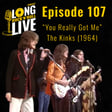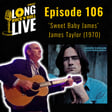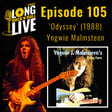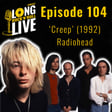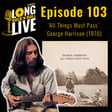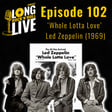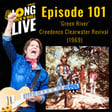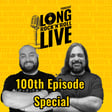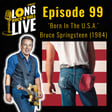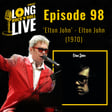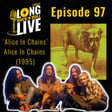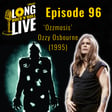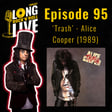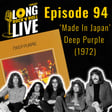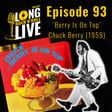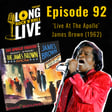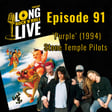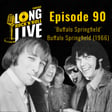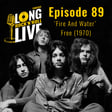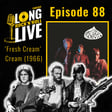Podcast Introduction and Platforms
00:00:01
Speaker
Hello there and welcome back to another episode of the Long Live Rock'n'Roll podcast with myself, Lazmyne Khalid, using your co-host on the screen opposite me, Mr Felipe Amorim. How you doing, bro? All good, bro. How are you doing? Yeah, very well, thank you very well, keeping well here. In fact, welcome to new listeners and new viewers. We are re-energizing and revitalizing our YouTube channel, which is why you can see our gorgeous faces if you're watching this on YouTube.
00:00:28
Speaker
We're going to put in a lot more effort to the YouTube guys, so every episode that you hear is going to be on YouTube. If you don't like sitting and listening things on your car speaker or on your headphones and you want to get a bit of a visual thing going on, come to YouTube. And YouTube viewers, if you're sat here and you don't have time to sit and watch the video and you want to do it on your journey to work,
00:00:46
Speaker
Go and check out the podcast, which is on Apple, Spotify, Amazon and all the other stuff like that. So welcome to any new viewers or listeners. I always thought I had a good face for radio, but now everything is on YouTube now, isn't it? I think you should just wear your Chewbacca t-shirt every week because then you can just do the comparison, right?
Exploring Classic Albums and Rock History
00:01:10
Speaker
So for anyone who is new tuning in, what we do is we talk about classic albums and classic bands and all in the life of rock and roll, some topics. You know, we're both pro musicians who've toured the world and played with numerous different bands and artists. And so we just talk all things rock and roll. But the main aim of this podcast and this show is to basically remind everyone of all those albums from days gone by that we think you need to check out.
00:01:38
Speaker
whether you're a 60 year old who's heard it but hasn't listened to it in 20 years, or if you're 15 years old and you're getting into the old music that your parents used to like or whatever, this shows for you because we're going to take you right through the history books, all the way from the 40s, 50s, all the way through to modern day, checking out the classic albums and bands that we think are worth your time.
00:01:58
Speaker
So welcome and let's get started. So today we're going to be doing a classic album. I mean, I just said it, they're all classics that we do, aren't they really?
Focus on 'London Calling' by The Clash
00:02:08
Speaker
But we're going to be doing London Calling by The Clash. Now, this is an album that you chose for me to pay. So do you want to tell people why? Why did you choose? Why did you put this on the list? Well, it's kind of special for me that now that I live in London.
00:02:23
Speaker
There's a lot of references to life in London and life in the UK in general, which wasn't a thing for me back in the day when I first listened to The Clash and I first listened to it. The main reason why I wanted to talk about it is because my my earliest memory of this album was a Rolling Stone magazine.
00:02:47
Speaker
kind of 100 you know the best 100 rock albums that kind of you know those lists that everyone disagrees with because obviously you can't you can always mention which albums are the most important in rock and roll history but it's really really hard to actually decide on the top 10 or top five but anyway on that list there was London Calling and I didn't actually know the album by then but
00:03:17
Speaker
the cover was so remarkable. And I knew that was an Elvis Presley album that they kind of nicked the font and the colors, put different picture and that picture is so rock and roll. So my first kind of interaction with the album was just a picture of the cover
00:03:40
Speaker
And then now, like researching about it, I figure out that the photographer who took that picture didn't want it to be used by the band because she said it wasn't good in terms of lighting, it was a bit blurry or whatever, it wasn't the best picture. I actually want to double check the information because I think that was in New York
00:04:01
Speaker
the Palladium in New York in September 1979. So the photographer, what is her name? Penny Smith. So she said she didn't want it. She really didn't want it because it's not my best picture, doesn't it? But it's
00:04:20
Speaker
It captures such a great rock and roll moment. The bass player is mashing his bass. Apparently he was unhappy with the bouncers at the venue who told people to never stand up during the gig.
00:04:36
Speaker
Exactly. That's not rock and roll. Breaking your base at the end of the gig, that's rock and roll. And that base is now in the Museum of London, yeah, after being exposed at the Rock and Roll Hall of Fame in Cleveland. So it's yeah, it has become a museum. Interesting.
Trivia and CBS's Influence on 'London Calling'
00:05:01
Speaker
Well I'll give all I do normally do is I normally give some quick fire details about the album just so that everyone knows you know so the basic details. So the name is London Calling, the artist is The Clash. It was released on the 14th of December 1979.
00:05:14
Speaker
and it was recorded in the months prior, August to November of 79. Genres you'd associate with it would be punk rock, post-punk and new wave. It's 65 minutes long and the producer was Guy Stevens. And to kick off before we get into the album, I've actually got a quiz for you, Felipe. Oh, wow, right away. Let's go, I've got three questions, right. Question one, which song was left off of the album's sleeve and why?
00:05:40
Speaker
as the last song Training Vang. That's the one yeah do you know why? Because they finished the song after these leave was ready so it's not it's not listed yeah so some people actually thought that song was kind of a hidden song you know but it wasn't it was just oh my god we found this track we found another track it was just not listed yeah
00:06:02
Speaker
Question two. When rehearsing for the album, the band had an afternoon and an evening rehearsal. But what two things did they do every day in between the rehearsals? They played football. Oh, the other one. I don't know. I know they played football in between rehearsals. That's right. What did they do after the football? A cup of tea. No. What's the other British thing to do?
00:06:29
Speaker
After football, watch telling no. It's like the tea, but think different.
00:06:39
Speaker
Oh, do you go to a pub? Yes. Yes. So basically, OK, so the routine for the rehearsals was like rehearsal in the morning, you know, start the day and then play football. Very British. Go to a pub, even more British. And then go back to the studio and rehearse again. That's it. That's exactly it. Well, what a life. That's pretty cool. Well done, man. Two out of two so far. And the final question.
00:07:06
Speaker
How did the clash get around CBS's demands of the way the album should be released? Oh, that's a tricky one. I know the label didn't want a double album. Yeah. So how did they get around? How did the clash get around that? I don't know what they did, to be honest. I tell you, they released a single album, which was the first half, with a bonus seven inch.
00:07:34
Speaker
that then became a 12 inch bonus with nine bonus songs. They said to the people, they said, listen, let's do this album and then we'll just do a little bonus seven inch with three songs. Okay. Let's make it five songs. Actually, let's go 12 inch. Let's make it eight songs. Actually, we're going to make it nine. So that's how they got around it. I mean, very clever, very cheeky.
00:07:59
Speaker
very the clash but yeah that's it. So I got one and a half questions out of three right? Yeah well two and a half. Yeah well done man well done well done all good. So let's jump into the album because I'm sure obviously we've got both got lots to say about it. Now an interesting place to start would be that
The Clash's American Music Influences
00:08:23
Speaker
From their previous album was called Give Them Enough Rope which came out in 1978 and it was very traditional and English punk. Then in early 1979 they started touring around the world and mainly the USA and the oddest thing is the kind of support bands that were supporting them on the road. Do you know about this? I know Bo Diddley was supporting with it and Sam and Dave.
00:08:49
Speaker
These welcome roles sold artists. What are they doing supporting an English punk band? I just found it really odd and interesting. The Clash wanted those guys on the road with them because they wanted to make a statement about, we're not a punk band anymore. Yeah, brilliant stuff. Well, because of that, because they toured so relentlessly with these other artists, they became influenced by the music. They started hearing. We hear this so often, don't we? The U2 episode, they went to America
00:09:19
Speaker
And Bono started sort of feeling his blues and Irish heritage come back. And they just had this plethora of new music that was being put onto them through the tour. And what happened is they ended up, when they were starting writing this album, they got writer's block. They really struggled to come up with any new punk songs. And so they started messing around and jamming in the rehearsal room.
00:09:45
Speaker
bringing in those influences of the R&B, the reggae, the soul, the rock and roll stuff. And that's where the writing process for London Calling began.
00:09:54
Speaker
Yeah, that's an interesting thing because they actually went to the rehearsal, okay, they were having a bit of a clash with the record labels regarding contracts and management and all that stuff. And they really wanted to do things their own way. How many of the albums we're reviewing that have that story, how many of those great albums start with a band
00:10:22
Speaker
not having a good time with the management or label and wanting to do things their own way, which is rock and roll. Rock and roll is that freedom.
Genre Blending in 'London Calling'
00:10:31
Speaker
I want to do things the way I want to do them and I just don't
00:10:36
Speaker
don't want the label to get in the way or producers or whatever so so they but they, as I said, they had writers block so they had nothing nothing done until the moment they got into the studio because it's normal for songwriters to keep writing stuff.
00:10:52
Speaker
and just have loads of songs or parts of songs to work on. So you go to a studio and say, look, I've got this, I've got this riff, I've got these lyrics, whatever, they had nothing. So they went to a rehearsal room, as I said, that like really relentless rehearsing, drinking, playing football routine. Yeah, sweating, sweating from the match, drunk in the park.
00:11:16
Speaker
without actually having any songs from the beginning. So partly the second song, Brand New Cadillac, which is one of my favorites on the album, they were using it as a warm-up song. So they started rehearsing playing that riff and warming up, and that became a song. So that, again, takes us back to that moment in time when every rock band would be
00:11:43
Speaker
laying together all the time rehearsing, writing songs as a band, not as individual songwriters who happen to be in a band. And I think this is the most exciting way of writing music. And my favorite rock songs were written like that. Yeah, they are. I mean, you mentioned Brand New Cadillac. Did you know it's actually a cover by a guy called Vince Taylor?
00:12:06
Speaker
All right. I don't know. Yeah. Yeah. So they were using it as a warm up song. Interesting. Well, there's two covers on this album. Yeah. The other one's near the end. It's Revolution Rock, which is the original by Danny Ray. For new viewers and listeners, anytime what we have is if you see at the bottom of your show notes, this would be on YouTube and in the podcast. We've got a link to a playlist. Now that takes us that takes you guys to my Spotify, where I make playlists with the album that we're talking about and any other songs that we mention will be added in so you can have a listen.
00:12:35
Speaker
If we compare it to a song, you're gonna hear the original, you're gonna hear the comparison, and it's all there for you guys. So check the show notes and the YouTube description for that playlist. So yeah, as you said, Felipe, they brought two songs in that they were enjoying playing in their downtime, enjoying playing in the rehearsal, and that they felt was actually beginning to shape the rest of the album. But those two covers were the first ones to be recorded, I imagine, because... Yeah, you would. Apparently, Brand New Cadillac was the first one that they recorded start to finish. True, yeah. And if I'm not wrong, most songs were done in a couple of takes.
00:13:05
Speaker
Yeah, they did, they did, which is, which is unusual. Well, it's not unusual, but it's.
00:13:09
Speaker
It's interesting because it sounds like a very polished album playing-wise, doesn't it? It does, especially for the guitars, right? When you listen to the guitars, the two different guitars, the tones and the phrasing of the playing is actually really well arranged. And that's one thing that for me really sets them apart from the punk movement. I love punk music, I really do, but I sometimes
00:13:36
Speaker
I've never discussed it. I love it. I love playing it. I like bands like Green Day, Ramones. I really enjoy that. If you can consider those guys, all those guys. Definitely, definitely. Yeah. Yeah. Not that familiar with Sex Pistols, but I think they're good, really good. But the thing is,
00:13:52
Speaker
Punk is famous for the kind of music that people who are not great musicians can play, which is not really a fair statement. But what is fair to say that is, as a rule, punk is very simple.
00:14:08
Speaker
feel chords, arrangements that don't tend to be long or clever. The Clash simply broke all those rules. I think they just wanted to be a band. They didn't want it to be a punk band. I have a question for you. Do you consider them more punk or new wave? Bro, this is really interesting and I'm sure
00:14:31
Speaker
You want a quick answer from me, but actually what we can do is we can go down the rabbit hole with this because I had put off listening to this album for a while and there's no, it's not like it came on. It's not like it was on my to listen to list and I just like, oh, you know, I don't fancy it.
00:14:47
Speaker
Whenever I saw it in the lists and, you know, I see the top 100, 500 greatest albums list, I put some, I put them all in this playlist that I can listen to. And when it came to it, I just saw it. I was like, you know, I don't fancy it because I don't like punk, really. There's punk I do like. You know, we did the Green Day Review a few episodes ago. I enjoyed that. But in general, I do not like punk and I'm not crazy about 70s punk. So when I saw a punk album, arguably the most famous punk album of all time,
00:15:14
Speaker
released in 1979 by one of the most famous punk bands, I was just like, no, I don't think this is going to be for me. London Calling is a fantastic song and I actually like that a lot, even before I listen to this album. And if I'm being honest, I think that's the only punk song on the album.
00:15:33
Speaker
wow i think man you know what you know what this because this this album's got 19 songs right yeah got the list with me i'm running through it because i want i want to want to see if i can prove you're wrong well here right uh i'm not down
00:15:48
Speaker
um there's a little little things like in song 17 i'm not down there's a little metal gallop so you've got to think heavy metal has been going for about nine years at this point and in it you hear the rhythm which again that's a little complex for punk yeah it's punky but that's still way more coming from metal so i'm not down i thought was punky um and honestly bro that's really the only ones i really have that i can think of as punk uh so for me you're gonna hear it in my monologue but
00:16:18
Speaker
I think this is the punkiest non-punk album ever. Basically what I'm going to say now, sum up my thoughts on it. The attitude, performance, lyrics, energy, passion is all 100% punk, but the music I feel is not. I feel, and this is going to be my big reveal later in the episode, may as well do it now, I hear so much
00:16:47
Speaker
Britpop. For me, this could be the album that started Britpop. Lost in the supermarket? That's just like pulp, isn't it? Years before them. Yeah, year 2000. Spanish bombs. But I'm saying it's like Pope years before Pope came about. Yeah, absolutely. It reminded me of the song, Pope, year 2000. Yes.
00:17:12
Speaker
Yes, it does. Even the melody sounds a bit like that. Maybe Paul took the idea from them. You've got songs like Hateful, that was light and upbeat. Keyboard sound, very produced. You've got Spanish bombs, which is quite Brit Poppy. He's speaking the foreign language in Spanish. We've got that quite a bit in Britpop. Well, so we've got the card cheat, I thought was very Brit Poppy.
00:17:41
Speaker
and yeah just a few others really it just really felt yeah and the last song train in vain really reminded me of um bop by uh hansen um but i just really heard a lightness to it when you think of punk and rightly so you think aggression you think speed you think political lyrics which this album does do i'm sure we'll get into that later um you think
00:18:05
Speaker
dissonance, unagreeableness, unpleasantness, be it in the way he shouts the guitar notes, the production. When I hear punk, I think generally unpleasantness. That's the main thing I think about. Yet this album was in fact very, very pleasant to listen to. The chord progressions were lovely. The melodies were great. Some of the things like the horn arrangements
00:18:29
Speaker
Yeah, the the the Horna Rangers or some other punk band would use the horn section. Like I can't think of any. And so, yeah, that was my headline thing for the show is that for me, this is this is the first step of Britpop happening.
00:18:49
Speaker
Interesting. Just to add quickly, I haven't done my research into Britpop yet, you know, for those who have listened before, I've studied quite extensively the history of heavy metal and hard rock music, but I haven't really delved further yet. And I can't say, you know, maybe there is an album in 1975 that could be called the first Britpop album, whatever. But to me, and from my listening experience, this is the first and earliest album that I think could be Ground Zero for Britpop.
00:19:17
Speaker
Wow, that's a very interesting statement. That's something I'd, I couldn't see this coming. That's interesting.
The Clash's Musicianship and Unique Sound
00:19:32
Speaker
Yeah, some styles are really evident in the album. Reggae and Ska, that's really, really evident throughout the album. There's loads of rockabilly, which is an early rock and roll and country. You can hear that on the grooves, you can hear that. And the song Jimmy Jazz is essentially jazz. It is, yeah.
00:19:54
Speaker
Because the drummer had a jazz background, which is unusual for Pug. So that's the other thing. I think if you isolate the vocals, technically the vocals are not polished. They're very punk vocals. If I isolate the vocals and the lyrics,
00:20:15
Speaker
maybe that's where you can find the essence of punk. But the musical ability is like, you know, the musicianship is really, really high level there. So they play really well. All the arrangements are clever, are well thought. So that really sets them apart from any other punk band.
00:20:39
Speaker
And I completely read, just looking at my notes, the other one that I thought was actually says, feels like the most punky one on the album was Coca-Cola for me. Just add to that. Which is not about the drink.
00:20:51
Speaker
No. You mentioned Scar and something really interesting is that we had this Scar revival beginning at the end of 70s and the early 80s with bands like Madness and The Specials coming out and really mixing this reggae with rock music essentially and The Specials released their first album in 1979, a few months before this one, and I found it really funny that the first Scar song on this album, track five called Rudy Can't Fail,
00:21:20
Speaker
and the specials on their first album has a song called a message to you Rudy. Oh you know the one a message to you Rudy. And it's very skyy so I just found it interesting I wonder if there was a little um I don't know a little homage paid between the bands of making a scarf song with the name Rudy and you know I've got no idea um there's yeah
00:21:44
Speaker
They say that the song, the information I found about this, the song revolves about Rudy, who is a part of the Rude Boys, a 60s Jamaican subculture that became popular in the United Kingdom. So apparently those guys like to challenge the social norms and
00:22:06
Speaker
uh uh like one of the things that you should do should drink beer for breakfast so uh and joe strummer said i i got a got uh some uh i got a quote from joe strummer saying i wrote rudy can't fail about some mates who were drinking brew for breakfast
00:22:23
Speaker
they think nothing of it. Me, I'm past a stage where I can drink brew for breakfast, but not every day, and that's made me notice them. I thought it was a hell of a way to start a day. So that's, you know, adds to this story, doesn't it? Yeah, brilliant, brilliant stuff.
00:22:41
Speaker
Yeah, as we said, we've got a few Scar songs in there. You've got Revolution Rock, you've got the Coca-Cola, which I said was quite punky. I also thought it was pretty skyy. Wrong and Boyo. I mean, the intro actually sounds like it could be the band. It's very Americana for the first minute. But then after that, it goes into a bit of madness, bluesy, scarry stuff. Now, one that I was going to say Scar, but I'm not going to go with this, is the song Guns of Brixton, which to me is out and out reggae.
00:23:07
Speaker
because if you listen, it really, really reminded me of a song called, well, I think the bass and the music comes from a song called Hard That They Come by Jimmy Cliff. Yeah, there's a reference to it, doesn't it? It was, but also, for me, lyrically, there's a song by Bob Marley called Burning and Looting, and we'll put that in the playlist again, guys, which is about protesting the regime and burning and looting in order to get your message across.
00:23:33
Speaker
and I felt that the lyrics in the Guns of Brixton were probably the most political of the whole album. Check this out, you can crush us, you can bruise, you can, yeah, you can crush us, you can bruise us, but you'll have to answer to the Guns of Brixton. That's pretty deep when you think about it, and I think this is an anti-police, yes it is because it's about the anti-police riots in Brixton in the 1970s, 1971 I believe,
00:23:58
Speaker
I just felt that was really, really deep for a popular album. Again, we're only saying it's popular because that's what we're hearing from it, the Brit pop and stuff. In the end, they're still a punk band, aren't they? Still writing punky lyrics, undoubtedly a punk lyrics. Yeah, the song Clampdown also has references to the oppression of
00:24:20
Speaker
government. Some critics say that they were reflecting on the fact that punk is always questioning capitalism, and they kept doing that during this album. But the alternative is a stronger government, which they think is really bad as well. Basically, they're not giving you a way out of
00:24:48
Speaker
you know, any big issues in society is just like saying, well, capitalism is full of shit, but also giving more power to the government is not great as seen by, you know, extreme police intervention in people's lives and all that stuff.
Timeless Punk Lyrics and Social Resonance
00:25:06
Speaker
So how much of those themes are still like
00:25:10
Speaker
It still resonates with what's going on in the world today or in many different countries today, not necessarily in the UK to the same extent, but... Well, I think you have to... Maybe, maybe. Yeah, you have to look, you know, and something that makes albums timeless can also be the lyrical content. I mean, I say, I was about to say nine times out of ten, but that's just for me. Nine times out of ten for me.
00:25:34
Speaker
what I love to hear in a past album is something that could still be considered great today, but be it chord progressions, melodies, production, all that sort of stuff, that for me constitutes a classic album. But for some people, undoubtedly lyrics are going to matter. And if certain, you know, you've got to think punk movement was so important in giving young people of the 70s
00:25:57
Speaker
an outlet and a voice you know it became more you know the the giving a young people an outlet in the 80s became more towards heavy metal in the 90s it was more grungy but in the 70s it was most definitely punk because you know the Beatles were doing it in the 60s with their lovely suits and everything but the 70s had punk and this was the the well I said yeah the outlet that young people had to be able to to align themselves with a cause and I think
00:26:27
Speaker
for people who grew up with this album, for teenagers who grew up with this album and who the lyrics probably meant a lot to, it is going to be timeless, isn't it? The lyrics are going to mean the same thing to you today as it did back in 1979. And that could be because of your own government or because of foreign governments. Yeah. Well, there's always I think history always repeats itself. Right. Yeah. So parts of those lyrics are going to be
00:26:58
Speaker
they're going to sound like they're talking about this day and age. They're going to sound like they just written the album.
Analyzing Themes in 'London Calling'
00:27:04
Speaker
One thing I really want to talk about is the fact that they open the album with London Calling, which I think is the best song on the album.
00:27:14
Speaker
I agree. Punk song in the album, although what makes the album special is that they go away from Punk. But this song is so iconic and so well played, well written. There's a couple of things I want to say about it and I want to ask you a question about it as well.
00:27:31
Speaker
For me, this song is a statement of rock and rollness and the rebel behavior in a certain way. It swings and rocks, but it's dirty and dark as well because of the lyrics. It's interesting. There's a swing to it. It's a shuffle feel. It's triplet based, which is not like straightforward rock.
00:27:54
Speaker
It's still very punk and still very, very dark. And I don't know if it's a call for a change or if it's just like acknowledging that that's the end of an era or things are not going well, whatever it is. But Joost Frommer, again, he said in an interview in 1988 to Melodimaker magazine,
00:28:14
Speaker
He said, I read about 10 news reporting one day calling down all variety of plague zoners. So basically, he was telling that the news there were
00:28:26
Speaker
all about making you feel scared and fear that the worst is coming. As he said, all variety of plagues and I think the news haven't changed at all. It's all about like if we scare people, they're going to keep reading because they want to know if you can get worse.
00:28:48
Speaker
And if you keep giving them more and more things to be scared about, they're going to keep buying. Nowadays, more about keep clicking, right? Oh, I'm scared. Who died today? Or who's going to die tomorrow? What kind of event is going to bring the end of the world? I mean, I'll tell you this. I'm not going to get into this too much, but since I was
00:29:11
Speaker
a child really in school, which means before you were born. I've been listening to it. For new listeners and viewers, I am about 11 years younger than Felipe, so carry on, please, sir. Which makes me old as fuck.
00:29:30
Speaker
It's good because we can say the F word as many times as we want in this show. But since I was a young child, I was listening to teachers and
00:29:46
Speaker
TV presenters telling us that there's gonna be a climate catastrophe or there's gonna be a World War III, right? I'm kind of still waiting for those events. Are they getting any closer? It might be true, but it's almost like you need to live in constant fear. And I think the whole idea of the song London Calling is to say, this is what they're telling you. And I have the feeling that the album gets
00:30:16
Speaker
lighter as it moves towards the end. It feels like it's more cheerful at the end, it's more optimistic. Because there's loads of references to these events and the dark side of life in a big city from the beginning, but it gets lighter, it gets more sarcastic, more fun, more clever as it goes along. And I think when it gets to the end of the
00:30:42
Speaker
the album you're feeling better than you feeling at the beginning that's one of the best things about the album my opinion that's a fantastic point man it's absolutely brilliant because it does and in the first sort of five tracks you're really bouncing around because you've got the punky one then you go to rock and roll then you go to the jazz then you go to the brit poppy one then you go to the scar
00:31:01
Speaker
so it's a bit of a mishmash and then the album kind of refines doesn't it after you get through those verse five it refines into a much more uplifted album now it's interesting because everything what you just said about the album is how i feel about the song a lot of it is so minor and dissonant and for anyone who's excuse me um for anyone who's not aware what the word dissonant means in music it's where two notes you're playing two notes and they don't sound nice together
00:31:28
Speaker
that it creates an unpleasant sound, not nice to the ear. And you hear this a lot in heavy metal, you might hear it in jazz as well. Now, the word dissonant can be associated with minor darkness, sadness, etc. So throughout London Calling Fleet, as you said, I hear this sadness, I hear this dissonance, I hear this darkness, and then it changes.
00:31:50
Speaker
It changes in the song several times because he's describing everything that you said, the misery, the sadness, the darkness in his life. And having lived in London and being born in London, I'll tell you now, you know, having studied, been born there, lived there for about six years whilst I was studying, when I think of going and living back there personally,
00:32:10
Speaker
I don't want to do it because I've acclimatized to the countryside now. I like living here. I like my fields and my walks. But you cannot ever take London out of the man or the woman, you know, depending on who you are. There is something inherently homely about London, especially if you've been born there. And there's a lot wrong with London as well. Prices, you know, all this sort of stuff. But when you think about all the negative stuff,
00:32:39
Speaker
it gets overridden when you think of the London Eye, Big Ben and all that stuff. And I think the same in the song because there's one moment in the song where it changes from being sad, minor and dissonant to pleasant, major and consonant, which is the opposite dissonance. And you've got him saying all the minor stuff until I live by the river. That moment is when it gets happy. The song changes for one second or four seconds.
00:33:10
Speaker
But he's talking about the sadness and then he's like, here's all the sad shit. No problem. Do you know why it's not a problem? I live by the river. And I think that's just fantastic. That alone is a reason to be happy. Oh my God. But that's the point, isn't it? You can complain all you want about London. I know London in this song is a metaphor for the government and all that sort of stuff.
00:33:32
Speaker
It doesn't matter because you live by the river, man. You live in London. What's better than that? One of the best cities in the world. And I just found that so interesting that, you know, we get this one taste of happiness in that song. And it's when he's saying that he lives by the river.
00:33:46
Speaker
Yeah and the melody is so well written, it leads you to that part and it really hits you when it gets to that point and says I live by the river. I had the same feeling when I was listening to it again, now understanding the lyrics when I was younger and listening to the idea.
00:34:09
Speaker
And yeah, it does make a few feel like, yeah, there's some hope. And it's not like hope that there's an interesting thing. It's not hope that the world is going to get better or governments are going to get better or all the problems that we see in the news are going to end. It's just like, yeah, I live by the river. It's just like there's some elements in daily life that can make you happy. You know, there's love. There's like nice places to go. There's people to spend time with. And I think there's a lot of it.
00:34:36
Speaker
And one thing I asked you to do in case you haven't done was to watch the video. Wasn't it last? Yeah, yeah. Beautiful for this song and the link in the show notes for everyone. I didn't listen. You said just watch the London calling video clips. I didn't know which one exactly, but I did put the video on and I sort of hopped through it just in case that's what you wanted me to. Yeah, is it was the one of them playing about to see appear, right? Yeah. So that that calls for a segment.
00:35:05
Speaker
go for it. How rock and roll is that? Because you have four piece band, two guitars, bass and drums. Without one lead singers and he got two lead singers. Yes. Playing
00:35:21
Speaker
They all appear at night playing their instruments, and it's raining at some point in the video. I don't know if this rain is throughout the whole video, but you can see the rain. There's a short just from the side of the drum kit, you can see the rain.
00:35:37
Speaker
And it's just that. They play on a pier in the dark and there's nothing, there's no actors, there's no special effects, there's no, it's just a band playing. And I think it's a cheap video. So, you know, how rock and roll is that video of a band in London, playing at the pier, singing about London, singing about life in the city,
Rating the 'London Calling' Video
00:36:01
Speaker
dark, miserable London weather. Sometimes less is more, isn't it, in terms of video making, you know, some of the best videos can be something where actually not much is going on. But what is going on is vitally important. So how rock and roll is that? Again, for new viewers and listeners, we do these, these are one of several segments we do.
00:36:20
Speaker
where we ask how rock and roll is it, describe the action, and then we rate it out of 100. So that act in itself is pretty rock and roll. You put it high 70s, early 80s, but then you have to consider that the song that the music video is for is as important and relevant. So I'm going to hit this with a solid 88.
00:36:40
Speaker
very rock and roll and the song as well you know like we've just spent five minutes going on about it so don't you say it again but the song matters as much as the video and it is fucking incredible love that song when the song is good the video is just an excuse to to listen to the song again it's not you know i think they knew they didn't need much for that it's like this is a fantastic song let's just picture a band in london and that's it
00:37:05
Speaker
Literally less is more, literally. Yeah. I'll never go to that period with the same feeling again now, because I don't remember watching this video back in the day or any moment until I actually did my research for this episode. So next time I'm about to see, I'm going to definitely remember the video. One thing I was going to talk about was we talked about the horns in some of the songs, which I thought were fantastic. The group that played the horns were called the Irish Horns Group.
00:37:34
Speaker
Um, which is fantastic that you hear them in revolution rock. Um, where else do they come out? Um, the right profile, you've got the saxophone and the horns as well. And I just thought that was really cool because there's another one. I don't know. It is the right profile. That sounded, that sounds like a song to me called everybody needs somebody by a soul artist called. Oh shit. What's his name?
00:38:00
Speaker
Solomon Burke, I think it is. Again, I'll find it guys, it'll be in the playlist. But you know the one, don't you think? Everybody needs somebody from the Blues Brothers. And it really has that soul and Motown vibe. And then compliment that with the horns and the saxophone. This to me is where the Clash are taking those American influences from being on tour with Sam and Dave and Bo Diddley. Yeah, see, it's
American Influences on The Clash
00:38:28
Speaker
It's the kind of stuff that if you're familiar with other genres, you can hear them in the album. But I imagine the most, well, the typical rock fan at the time might not have noticed. Yeah, but this is the thing that they don't go about making it. Oh, let's write a soul rock song. Let's write a Motown inspired song. These are just things that I think, I don't know, I think I don't want to sound arrogant, but I feel very lucky
00:38:58
Speaker
to have my ears because I really just naturally hear things and I can pick out things.
00:39:03
Speaker
I'm not saying others can't, they've become very apparent to me. From the moment I hear it, I can pick out certain things. Oh, that's a heavy metal rhythm. Oh, that's like a Motown drum beat. And I love that I can do this because I feel that I can hear where a song has come from. But as we've said, the package is then produced by The Clash and given to us as a new wave punk rock song that actually only to weird people like me comes across as a Motown inspired.
00:39:30
Speaker
But it's a different kind of song again, isn't it? A punk rock song with horns and saxophone. Yeah, exactly. But did you notice the Baudrilli beat on Hateful? I didn't. Thank God. It happens on the song.
00:39:46
Speaker
Oh, yeah. The fourth song of the album, the first album. Good spot, man. I missed that. No, which is a great song. It's a great song about drugs. They say, you know, like drugs are basically saying that they enjoy it, but they hate the fact they're not for free to pay for them. You know, so that's what the song is all about. But that's what's hateful about it. And they have this bow diddly beat, which I actually put on my notes to ask you if you'd notice it, because I don't think it's that evident. It's just hidden there.
00:40:15
Speaker
You know, it's just there. Yeah, interesting. And there's a there's another one which I found completely unexpected on the song I'm Not Down right at the end of the album. Yeah, there's a bion groove, which is Brazilian. It's a Brazilian rhythm.
00:40:35
Speaker
and it happens at the end of the album. So being Brazilian I recognize I used to play this kind of music and I don't know if they did it intentionally or if it's just something that sounds like it. That song's got loads of different parts and I think that only happens on the second verse and it's one of those things like the whole
00:40:58
Speaker
song is great in many ways. Specifically the song I'm Not Down, apart from the Bayon groove, which I just mentioned, I really enjoy the drum fills. I enjoy the fact that they wrote different arrangements for each part of the song. And it's a positive take. It's kind of like, yeah, you know, things are difficult, but, you know, I'm not down and I'm kind of like, I can still fight. And there's an interesting thing about that one as well. The first time they played it live,
00:41:30
Speaker
I think Joe Stromer said, I hope no one is contemplating suicide. And I don't know if it's just being sarcastic or just saying like, you know what, you might be going through difficult times, but this song is about like, you know, you can still make it.
00:41:48
Speaker
And I think that there's a positive message there. So, I mean, it's really, it's one of those albums. We can't talk about every single song because it's 19 songs. One thing I really enjoyed is the song, Death or Glory, again, from the second album, which... From The Bonus. From The Bonus 7. From The Bonus album, yeah. Which is possibly the best chorus and it's a very simple, straightforward chorus. And it's essentially pop music, maybe not the best song, but the best chorus.
00:42:17
Speaker
Can I tell you what I've written down for this song? And do you know the song Four Horsemen? Yeah. Rack 16. I really heard some Rolling Stones in it.
00:42:27
Speaker
interesting because I found Lovers Rock very much like Rolling Stones as well. So two consecutive songs that we can find. And you know what, for Lovers Rock I've got Clapton guitar playing. So it is kind of like that 60s blues rock thing with the Stones and Clapton. Man, this album's got it all, isn't it? For a 1979 album it literally has kind of taken
00:42:49
Speaker
all the music from The Beatles to 1979 and just sort of picked the best parts and made it into a multifaceted genre style album with punk attitude. Yeah, exactly. Exactly. Man, that's, you really managed to sum it up perfectly. It's what it is. It's got everything.
Comparing 'London Calling' to Other Clash Hits
00:43:12
Speaker
I think you said this at some point, it doesn't sound like they're trying to do that. I think they're just trying to not be essentially a punk band or to not emulate the sound they did previously, because the class for me was, should I stay or should I go? For me, it's Rock the Kasbah. That's the one I knew. So those are the two songs really that I think
00:43:41
Speaker
I think that to put them in the spotlight at first on this album sounds nothing like those two songs. Absolutely nothing like them. No, it doesn't at all. Yeah, it's really interesting, isn't it? I mean, very different styles. I mean, just talking about those three clash songs.
00:44:00
Speaker
Yeah, what a band and what an album. It's the variety of rhythms. You've got, we've mentioned Bo Diddley, we've mentioned Brazilian music, we've mentioned jazz, rockabilly. There's some marching band that's near playing. So there's near drum doing some marching band kind of vibe, that's on the card sheet.
00:44:25
Speaker
which has got a really heavy presence of piano as well, which doesn't happen anywhere else in the album. So it's at least unpredictable. When a new song starts, where the hell are these guys going to take us now?
00:44:44
Speaker
I completely agree. Bro, that's fantastic stuff, man. Are you anything else to say? No, man, I just yeah, I just recommend everyone to listen to it and maybe listen to this. It just crossed my mind that the album Kova is a reference to Elvis's first album, which we revealed. So guys, have a listen to to that episode. Yeah. And listen to those two albums.
00:45:13
Speaker
you know, in sequence and think about what rock and roll can be about. So rock and roll can be Elvis and can be the clash. And that's a long journey for one music genre in a matter of a few, a couple of decades, really. It's amazing what rock and roll became. And you see the reference on the album cover to a classic rock and roll album, but what they're doing
00:45:40
Speaker
is completely different, but still rock and roll in its essence. Well, you say that it is completely different in the final product. But if you remember when we spoke about the Elvis thing, Elvis did the same thing, bro. He took the black music from the gospel churches he was visiting. He took some of the early rock and roll from the studio that he was singing at. He took various elements as well and molded them together just like the Clash have done. So yeah, but that's a great show and especially. So maybe
00:46:10
Speaker
Stealing the artwork for the cover was very, very intentional in that sense. It's highly appropriate as well, I think, isn't it? Fantastic. Bro, let's finish with, I'm going to put you on the spot. Tell me your favourite, your three favourite songs. Oh wow. Well, one I'm calling for sure. Number one, yeah, for me as well. What's your number two? What's your second favourite?
00:46:31
Speaker
Man, I'm going to go for Jimmy Jazz. I'll tell you the second and the third favorites for the same reason. So it's going to be Jimmy Jazz and the right profile. Because those two songs are about characters.
00:46:51
Speaker
So the first one is about life in general and the city and the problems. Those two songs are characters. Jimmy Jazz is probably a fictional character and is like a criminal escaping from the police. Everyone's pretended to not have seen him anywhere, et cetera, et cetera, which is a very kind of a mafia style kind of story. And I loved it. And the right profile is based on the story, a real story of an American actor called Montgomery Clift. They actually mentioned his name on it.
00:47:19
Speaker
And he was, you know, addicted to alcohol, drugs and all that stuff. And he had a car crash in 1956. And then he died in 1966. So after keeping abusing drugs and alcohol. And so it was famously called the longest suicide in Hollywood history.
00:47:44
Speaker
So that song is about people passing by, you know, seeing the car after the crash and say, oh, you know, that's Montgomery Clift. So that's an interesting real story in one song, a probably fictional character in another song. And long on calling, you know, what can I say about that one? You've said everything about it. So those three songs for me, it's really hard to pick, but I had I had those songs in mind.
00:48:08
Speaker
Since it's a 19 song album, we really should have done five, but I think three is good, isn't it? What are your three favorite songs? So London Calling number one, I just think I genuinely think it might be one of the best songs ever written.
00:48:26
Speaker
in terms of what it stood for, you know, when we're talking about things like, you know, A Day in the Life by The Beatles, you know, trying to think of which Pink Floyd, when I choose, you know, echoes. You know what I mean? Like, where each band, like The Beatles, Pink Floyd,
00:48:41
Speaker
The Kinks, the Rolling Stones, they've got some really famous songs that stand out and I think this is one of them. London Calling just sits up there with the elite of the elite in terms of British pop songs. I know it's a punky song but it is popular. Number two, I've got the Car Cheat. I really really enjoyed the piano. It just took me by surprise and it took me in a lovely Brit poppy direction I just didn't expect. Number three, The Guns of Brixton.
00:49:07
Speaker
Burning and Looting by Bob Marley is one of my favourite songs and this really took me back to it and I love political lyrics when they have an impact, when they actually make you think. I sat there and I listened to it for the first time and I went, shit, that's bad. Obviously I'm all for freedom of speech and everything.
00:49:27
Speaker
But when I heard them say, you can bruise us, you can beat us, but if you do whatever, you're going to have to answer to the guns of Brixton. That's literally a message to the police saying, try and hit us, but we're going to shove guns in your face if you try.
00:49:39
Speaker
And I thought, hold on, and nowadays you'd be cancelled for that, wouldn't you, if you were to release lyrics like that. So yeah, they're my favourite three songs. And that's the one thing as well. I think Rock and Roll, at least back in the day, Rock and Roll wasn't afraid of talking about any subject. If you're in a Rock and Roll band,
00:50:00
Speaker
You want to go political, just go and do it. And you want to talk about, you know, drugs, you talk about them. That's fine. Or you want to talk about relationships. So that's it. You just do whatever you want to do. And that's very clear throughout the whole album. They did what they wanted to do. And we've said this many times in the show, isn't it? Most of the classic albums happened with the band 100 percent in control of the artistic process.
Monologue on 'London Calling's' Legacy
00:50:27
Speaker
Yep and you can hear this ready for my monologue? Oh man it's my favorite part always. So for new listeners and viewers I do a little monologue at the end of the show where I after I've done all my research I just write all my thoughts down into a few paragraphs and I give Felipe my monologue at the end so here we go. I'm not a huge fan of traditional punk and so I've steered clear of this album for what I now know to be way too long.
00:50:50
Speaker
But the clash and this album seem to be the catalyst between the Sex Pistols traditional punk sound and the new wave of punk that came in the 80s with bands like U2. The sheer variety of genres we are hearing that have taken the form of British post-punk is something quite staggering. Reggae, rock and roll, rockabilly, R&B and pop with an underlying punk attitude and sound results in a record that actually sounds way ahead of its time, despite the roots and age of all those styles that I've listed.
00:51:18
Speaker
When you forgo the expectations that fans lay on you and let a band experiment in their own time and at their own leisure, then you can really create something remarkable and godly.
00:51:28
Speaker
And I say this because I always refer back to our episode about the animals, where we saw a band who said, right, for this song, we're gonna write a blues song. And for this one, we're gonna do an R&B song. And subsequently, they then had an obvious blues song and an obvious R&B song. But with the clash, the unique combination of all of these styles didn't result in a, oh, this is an obvious reggae song. Even though we do have a few that say, okay, this is mostly Skaal, this is a bit rock and roll.
00:51:54
Speaker
It resulted in an overall sound that I can only think was one of the main inspirations for Britpop because I just cannot get away from this 90s pop sound that's going through the album. Hints of comedy, hints of pop, rockabilly, rock'n'roll, reggae with an underlying punk and rock'n'roll attitude. They really made something special here and I'm actually sad that I didn't listen to this album sooner as I really enjoyed it. It genuinely sounds like an album made by a band who were enjoying fitting their inspirations
00:52:22
Speaker
influences into an already established sound and unintentionally creating a brand new style in post-punk. It's not an album that I would put in my top albums of all time but I can 100% see and justify why others would. The biggest and best compliment I can give it is that this is the punkiest non-punk album I've ever heard.
00:52:44
Speaker
Wow. Well done again, brother. Thank you. Thank you. I love writing them, man. It's just like getting all your thoughts down into a mini essay. Guys, thank you again for joining us. You can find us on Instagram, Facebook and YouTube.
Closing and Social Media Handles
00:52:57
Speaker
We are at Long Live RNR Pod. And then you can follow us there and stay up to date on the episode. So once again, thank you for joining. And yeah, thanks for being with us. Thanks for the new listeners and thanks to all of you guys who have been following us for a while. And keep on working, everyone.
00:53:14
Speaker
And as usual, take care and long live rock and roll.

